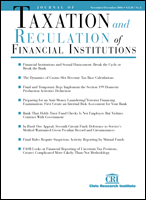Complete Issue
Author: Houman B. Shadab.
Source: Volume 24, Number 02, November/December 2010 , pp.1-64(64)

< previous article |return to table of contents
Abstract:
I am very pleased to introduce my first issue of the Journal of Taxation and Regulation of Financial Institutions in my new role as the Editor-in-Chief. Joining as Assistant Editors are current second year students at New York Law School, Leslie Ann Pasqualone and Nicholas Turner. Already, their expeditious and meticulous work has been a tremendous benefit to the editorial process. In addition, two individuals have newly joined the Journal’s Board of Advisors: James Farrell of Latham & Watkins and Timothy Becker of Akin Gump Strauss Hauer & Feld. We hope and plan to continue to bring the Journal’s readers unique, valuable, and actionable insights about tax, regulatory, and related developments affecting financial institutions. The type of cutting-edge, real-world knowledge from leading legal and financial market practitioners that is presented in the Journal has particular significance to me as a law professor whose research focuses on financial law and regulation. Learning about advancements in law and legal practice helps to inform my own research and writing. Indeed, the real world of practice should be an important driver of broader and more theoretical research about the nature and impact of financial practices. This is also true in the realm of normative policy research. Questions about how policy makers should craft law and regulation, and pursue broader policy objectives, must be informed by a sophisticated understanding of the innovative transactions and the particular challenges and unintended consequences facing practitioners. Knowledge imparted from the Journal, in addition to its direct relevance to those practicing in the field, is a type of applied research of high significance to those in the academic and policy-making communities. This issue begins by focusing on the unprecedented changes to the over-the-counter (OTC) derivatives legal regime initiated by the Dodd-Frank Act of 2010. Matthew Kluchenek provides a comprehensive overview of the derivatives title to the Act, detailing how certain transactions, intermediaries, and derivatives users will be newly treated as regulated products and entities. Importantly, Mr. Kluchenek also identifies new ambiguities and uncertainties following passage of the Act, including how parties are likely to allocate new compliance burdens and the broad scope of authority over particular issues given to regulators. Central to the new OTC derivatives regulatory scheme is the general requirement that such products be centrally cleared by a regulated clearing organization. The next article, by Jeff Bandman, takes an in-depth look at the growing role of central counterparty clearinghouses in the U.S., U.K., and Europe. Drawing upon the specifics of new legal requirements, as well as market developments and the positions articulated by clearing organizations and other participants, Mr. Bandman notes the several potentially contentious issues that have now come to the foreground. These issues include regulators balancing the potentially conflicting goals of stability and competition and the governance issues surrounding clearing organization membership and ownership. Although changes to regulatory regimes typically receive the most attention, market-driven changes are often just as important to practitioners. In this vein, Jedd Wider examines and analyzes the terms and structures increasingly making their way into the hedge fund market. Among the goals of these terms and structures is aligning the interests of managers and investors, increasing liquidity and transparency, and providing a more customized investment product for institutional investors. Finally, this issue concludes with Roy Crawford’s State and Local column, which focuses on the application of the economic substance doctrine by states. Crawford examines how recent federal codification of the doctrine raises the issue of state application, and suggests an approach for transactions to automatically qualify as having economic substance. I welcome your comments on the articles in this and future issues, and will be happy to consider your ideas on what other areas of bank and financial industry taxation and regulation we should publish on in future issues. Please also feel free to contact me about submitting an article for future publication. I may be reached by email at Houman.Shadab@nyls.edu.Keywords:
Affiliations:
1: New York Law School.